Many find solace and strength in believing that there's a divine plan guiding their lives, a belief often summarized as "everything happens for a reason." This concept, while offering comfort, also raises many questions and challenges our understanding of faith, suffering, and free will. This article delves into the meaning and implications of trusting in God's plan, addressing common doubts and offering a perspective grounded in faith and reason.
What Does "Everything Happens for a Reason" Really Mean?
The phrase "everything happens for a reason" doesn't imply a simplistic, predetermined fate where every event is meticulously orchestrated like a puppet show. Instead, it suggests a deeper, more nuanced understanding of God's involvement in our lives. It acknowledges that even amidst chaos and suffering, there’s a larger purpose at play, a divine tapestry woven from seemingly random threads. It's a belief that God works through circumstances, both good and bad, to shape us, strengthen our faith, and ultimately lead us closer to Him. This doesn't mean we always understand the "why" behind difficult events, but it does offer a framework of hope and trust in a higher power.
Does This Mean God Causes Bad Things to Happen?
This is a critical question, and the answer is a resounding no. Attributing bad things directly to God's actions is a misinterpretation of the concept. Instead, it acknowledges that God, in His omnipotence and omniscience, allows certain events to occur within the context of human free will and the natural order of the universe. He may use these events to bring about good, to refine our character, and to deepen our spiritual understanding. The suffering we endure doesn't come from God, but it can be used by God for our ultimate good and His ultimate glory. This perspective doesn't minimize suffering, but it offers a framework for finding meaning within it.
How Can I Trust God's Plan When Life Is Difficult?
Trusting God's plan during difficult times requires faith, patience, and a willingness to surrender to His will. It involves acknowledging that we don't have all the answers and accepting that sometimes, the path forward isn't clear. Prayer, meditation, and seeking spiritual guidance through community and scripture can be invaluable tools. Remembering past instances where God has brought you through difficult times can also bolster your faith and hope. It’s a journey of faith, not a destination of complete understanding.
How can I find meaning in suffering?
Finding meaning in suffering is a deeply personal and often challenging process. It's not about minimizing the pain, but rather finding a perspective that helps you navigate it. This often involves reflecting on how the experience has changed you, what lessons you have learned, and how you can use your experiences to help others. Connecting with others who have experienced similar struggles can provide support and a sense of shared humanity. Leaning on your faith and finding comfort in spiritual practices can provide a source of strength and resilience during times of hardship.
Is it wrong to question God's plan?
No, questioning God's plan is not wrong. Honest questioning and wrestling with faith is a natural part of the spiritual journey. Doubt and questioning can lead to a deeper understanding of your faith and a stronger relationship with God. The important thing is to approach these questions with humility and a willingness to seek answers through prayer, study, and community.
Does believing in God's plan diminish personal responsibility?
Absolutely not. Believing in God's plan doesn't negate our responsibility for our actions and choices. In fact, it often enhances our sense of responsibility, as we strive to live in accordance with His will and contribute to the good of the world. Free will and God's plan are not mutually exclusive; rather, they are intertwined aspects of a complex and beautiful reality. We are called to make choices, and God works through those choices to achieve His purposes.
Ultimately, trusting God's plan is an act of faith—a belief that even when things seem dark and confusing, there's a benevolent force at work, shaping our lives for our ultimate good. It's a journey of continuous learning, growth, and surrender, leading to a deeper understanding of ourselves, our faith, and the divine hand that guides our path.

